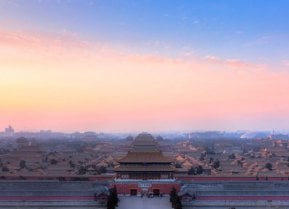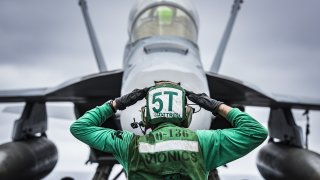A War Between the United States and China Is Not 'Inevitable'
One can reject the claim that war is inevitable while prudently acknowledging the possible and preparing for the worst. Great powers with military and economic might fight wars, but the relationship between the United States and China has two features that are uncommon in great power competition.
A war between the United States and China is not inevitable.
This idea of an inevitable war is rooted in the "Thucydides Trap," which posits that rising great powers often elicit fear in existing great powers. This fear often, but not always, has resulted in great power wars. U.S. policymakers, defense officials, and intellectuals have praised this framing of the challenge a rising China poses to a status quo United States. Others have been more critical of the Thucydides Trap but have argued that China is declining, which could still lead to danger and worries of war.
One can reject the claim that war is inevitable while prudently acknowledging the possible and preparing for the worst. Great powers with military and economic might fight wars, but the relationship between the United States and China has two features that are uncommon in great power competition.
First, East Asia has what Robert S. Ross calls the "geography of peace." The United States faces challenges projecting power onto the Asian continent, while China faces major obstacles projecting power off the continent. Due to developments in “anti-access, area-denial” (A2/AD) missiles and sensors, defenders possess great geographic advantages against the offensive. This can provide both the United States and China with baseline protection in their strategic objectives: "command of the commons" (the United States) and "active defense" (China).
Second, the two great powers have unprecedented economic interdependence, even as they attempted to selectively decouple. They are still deeply embedded, not just with one another, but within the same global trade and finance regime. This does not prevent war, but it significantly raises the direct and indirect costs of fighting, as long as both sides can expect future gains from trade.
Believing a war is “inevitable” is fraught with risk. If policymakers in both countries primarily entertain the idea that war will happen, then the range of prudent policy options becomes restricted. The primary solution to problems and security dilemmas is military in nature. This kind of mental model could be found in the strategic cultures of Great Britain, Germany, Russia, France, and Austria-Hungary during World War I. Policymakers in these countries all believed that war was inevitable and that conquest would be easy, creating what Stephen Van Evera coined, "the cult of the offensive."
If this belief grows, it will have a pervasive effect. U.S. and Chinese decision-makers will likely conclude that "windows of opportunity" are closing and seek to act sooner rather than later. Believing that war is “inevitable” binds national leaders to the choices presented before them, and considering other options becomes a moot point.
Stronger armies need to be created, which then increase the threats that Washington and Beijing perceive, as the U.S. military is now confronted with a further imbalance of power, which it seeks to correct. In response, the People’s Liberation Army asks for additional resources to alleviate U.S. gains. This cycle persists and East Asia becomes further militarized and conflict more likely.
But if the future is unknown and unwritten, as Jonathan Kirshner argues, then choices matter, and foreign policy is contingent. There are multiple futures and paths available to U.S.-China relations, of which war is just one possibility, not the “inevitable” outcome.
The United States can and should focus on adroitly employing all tools of statecraft to create stability in its relationship with China. American strength need not just be found in a capable military, though maintaining an "active denial" strategy is important. U.S. defense policy in East Asia should be focused on resiliency and defense rather than conventionally matching China’s military.
American policymakers should continue to develop relationships with their Chinese counterparts. More exchanges, like the recent trips to China by U.S. senators and U.S. Commerce Secretary Gina Raimondo, are needed. However, the relationship is not one-sided, and China will need to continue reciprocating and open up exchanges with its high-ranking officials.
The United States is not the only party at fault for the worsening communication. China continues to decline U.S. requests to meet with Chinese defense officials. The People’s Liberation Army Air Force has also conducted numerous unsafe intercepts of U.S. Air Force aircraft and has not apologized for the recklessness. It has also used harsh rhetoric towards U.S. partners and allies in East Asia.
But U.S. policy in the East Asia region needs to go beyond just raising concerns about China’s military. It needs to offer countries in the region economic incentives and demonstrate that it will promote, not erode regional stability.
A U.S.-China war is not “inevitable”. Therefore, the United States needs to get creative in forming a new relationship with China, one based on credible stability, candid disagreements, and limited cooperation. Both countries are secure and will remain great powers for a long time. The key is to move beyond framing war as “inevitable” and construct a new understanding, where each side has adjusted expectations of the other.
J. Tedford Tyler is a Program Officer at Stand Together Trust.
Image Credit: U.S. Department of Defense.


